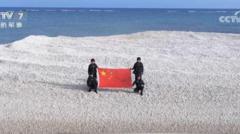In a significant move in the ongoing territorial dispute in the South China Sea, the Chinese coastguard has reportedly seized Sandy Cay, a tiny sandbank in the Spratly Islands. This action has drawn attention amid rising hostilities between China and the Philippines, with the former claiming sovereign jurisdiction over the contested area. The Philippine government has yet to issue a formal response, while the United States has expressed its concerns over the escalating situation.
Beijing's Coastguard Takes Control of Disputed Sandbank in South China Sea

Beijing's Coastguard Takes Control of Disputed Sandbank in South China Sea
Chinese state media reports that Beijing's coastguard has seized a small sandbank in the South China Sea, intensifying tensions with the Philippines.
The coastguard operation, depicted in images released by state broadcaster CCTV, shows officers standing proudly with the Chinese flag on the sandbank, which is located near a Philippine military base on Thitu Island. Although there are currently no indications that China intends to maintain a permanent presence on the sandbank, many regional observers are watching the developments closely. Tensions in the area have been high, as the ongoing Balikatan military exercises between the US and the Philippines continue, prompting criticism from China.
National Security Council spokesperson James Hewitt remarked that such actions undermine regional stability and violate international law. As both nations navigate these turbulent waters, military cooperation and exercises are pivotal in reaffirming alliances against perceived threats. Meanwhile, competing claims over the area remain a complex and continuous source of conflict, with China, Vietnam, Taiwan, Malaysia, and Brunei all asserting territorial rights in the strategically crucial South China Sea.
The South China Sea remains a flashpoint of geopolitical struggles, with China's expansive maritime claims illustrated by the controversial "nine-dash line" leading to ongoing friction and military posturing.
National Security Council spokesperson James Hewitt remarked that such actions undermine regional stability and violate international law. As both nations navigate these turbulent waters, military cooperation and exercises are pivotal in reaffirming alliances against perceived threats. Meanwhile, competing claims over the area remain a complex and continuous source of conflict, with China, Vietnam, Taiwan, Malaysia, and Brunei all asserting territorial rights in the strategically crucial South China Sea.
The South China Sea remains a flashpoint of geopolitical struggles, with China's expansive maritime claims illustrated by the controversial "nine-dash line" leading to ongoing friction and military posturing.



















